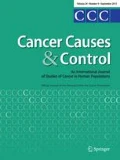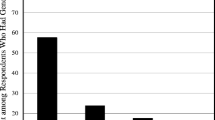Abstract
Purpose
Some cancers are largely preventable through modification of certain behavioral risk factors and preventive screening, even among those with a family history of cancer. This study examined the associations between (1) family cancer history and cancer screening, (2) family history and cancer preventive lifestyle behaviors, and (3) cancer screening and lifestyle behaviors.
Methods
Data were from the 2009 California Health Interview Survey (n = 12,603). Outcomes included screening for breast cancer (BC) and colorectal cancer (CRC) and six cancer preventive lifestyle behaviors, based on World Cancer Research Fund recommendations. Multivariate logistic regression analyses, stratified by gender and race–ethnicity, examined associations. Predicted probabilities of cancer screening by family cancer history, race–ethnicity, and sex were computed.
Results
Family history of site-specific cancer—CRC for men and women, and BC for women—was associated with higher probability of cancer screening for most groups, especially for CRC, but was largely unrelated to other lifestyle behaviors. In the few cases in which family history was significantly associated with lifestyle—for example, physical activity among White and Latino males, smoking among White and Asian females—individuals with a family history had lower odds of adherence to recommendations than those with no family history. Greater overall adherence to lifestyle recommendations was associated with higher odds of up-to-date CRC screening among White and Asian males, and lower odds among Asian females (no significant association with BC screening); this relationship did not vary by family cancer history.
Conclusion
The fact that family history of cancer is not associated with better lifestyle behaviors may reflect shared behavioral risks within families, or the lack of knowledge about how certain lifestyle behaviors impact personal cancer risk. Findings can inform interventions aimed at lifestyle behavioral modification for individuals at increased cancer risk due to family history.

Similar content being viewed by others
Notes
We use the WCRF/AICR recommendation cutoff for full adherence of 300 moderate-equivalent minutes/week in analyses shown here, but also conducted sensitivity analyses using the American Cancer Society recommendation of at least 150 moderate-equivalent minutes/week. Some associations are lost when using the dichotomous ACS cutoff; thus, we chose to use the more nuanced measure in final analyses.
References
Kushi LH et al (2012) American Cancer Society guidelines on nutrition and physical activity for cancer prevention. CA Cancer J Clin 62(1):30–67
World Cancer Research Fund International American Institute for Cancer Research (2007) Food, nutrition and the prevention of cancer: a global perspective. AICR, Washington
Hemminki K, Sundquist J, Bermejo JL (2008) How common is familial cancer? Ann Oncol 19(1):163–167
Slattery ML et al (2003) Family history and colorectal cancer: predictors of risk. Cancer Causes Control 14(9):879–887
Valdez R et al (2010) Family history in public health practice: a genomic tool for disease prevention and health promotion. Annu Rev Public Health 31(1):69–87
Bastani R et al (2008) Validation of self-reported colorectal cancer (CRC) screening in a study of ethnically diverse first-degree relatives of CRC cases. Cancer Epidemiol Biomarkers Prev 17(4):791–798
Bastani R et al (1999) Tailored risk notification for women with a family history of breast cancer. Prev Med 29(5):355–364
Glenn BA et al (2011) Changes in risk perceptions in relation to self-reported colorectal cancer screening among first-degree relatives of colorectal cancer cases enrolled in a randomized trial. Health Psychol 30(4):481–491
Martínez-Ochoa E et al (2012) Influence of family history of colorectal cancer on health behavior and performance of early detection procedures: the SUN Project. Ann Epidemiol 22(7):511–519
Ponce NA et al (2012) Disparities in cancer screening in individuals with a family history of breast or colorectal cancer. Cancer 118(6):1656–1663
Townsend JS et al (2013) Health behaviors and cancer screening among Californians with a family history of cancer. Genet Med Adv 15(3):212–221
Madlensky L et al (2005) Preventive health behaviors and familial breast cancer. Cancer Epidemiol Biomarkers Prev 14(10):2340–2345
Yoon PW et al (2002) Can family history be used as a tool for public health and preventive medicine? Genet Med 4(4):304
Claassen L et al (2010) Using family history information to promote healthy lifestyles and prevent diseases; a discussion of the evidence. BMC Public Health 10(1):248
Berrigan D et al (2003) Patterns of health behavior in U.S. adults. Prev Med 36(5):615–623
Kaczynski AT et al (2008) Smoking and physical activity: a systematic review. Am J Health Behav 32(1):93–110
California Health Interview Survey (2011a) Report 1—sample design, in CHIS 2009 methodology series, UCLA Center for Health Policy Research, Editor. UCLA, Los Angeles
California Health Interview Survey (2011b) Report 4—response rates, in California Health Interview Survey 2009 Methodology report series, U.C.f.H.P. Research, Editor. UCLA, Los Angeles
National Cancer Institute. Health Information National Trends Survey (2003) Final report 2003. Available from: http://hints.cancer.gov/docs/HINTS_2003_final_report.pdf. Cited 8 Sep 2012
US Preventive Services Task Force (2012) Recommendations for Adults. Available from: http://www.uspreventiveservicestaskforce.org/adultrec.htm. Cited 9 Aug 2012
US Preventive Services Task Force (2009) Screening for breast cancer. Available from: http://www.uspreventiveservicestaskforce.org/uspstf/uspsbrca.htm
StataCorp (2011) Stata statistical software: release 12. StataCorp LP, College Station
Centers for Disease Control and Prevention (2012) Cancer Screening—United States, 2010. Morbidity and Mortality Weekly Report. 61(3)
US Department of Health and Human Services (2013) Percentage of adults who receive colorectal cancer screening as appropriate: National Health Interview Survey. Available from: https://healthmeasures.aspe.hhs.gov/measure/25#additionalInformation. Cited 26 Mar 2013
Centers for Disease Control and Prevention (2010) Behavioral risk factor surveillance system survey data. Available from: http://www.cdc.gov/cancer/colorectal/statistics/screening_rates.htm. Cited 26 Mar 2013
Meissner HI et al (2012) Breast and colorectal cancer screening: U.S. primary care physicians’ reports of barriers. Am J Prev Med 43(6):584–589
Spector D, DeRoo LA, Sandler DP (2011) Lifestyle behaviors in Black and White women with a family history of breast cancer. Prev Med 52(5):394–397
Wickrama KAS et al (1999) The intergenerational transmission of health-risk behaviors: adolescent lifestyles and gender moderating effects. J Health Social Behav 40(3):258–272
Hartman SJ, Dunsiger SI, Jacobsen PB (2011) The relationship of psychosocial factors to mammograms, physical activity, and fruit and vegetable consumption among sisters of breast cancer patients. Int J Womens Health 3:257–263
Viswanath K, Ramanadhan S, Kontos EZ (2007) Mass media, in Macrosocial determinants of population health. In: Galea S (ed) Springer, New York, pp 275–294
Courtney RJ et al (2013) A population-based cross-sectional study of colorectal cancer screening practices of first-degree relatives of colorectal cancer patients. BMC Cancer C7-13 13(1):1–11
Rosenstock IM (1974) Historical origins of the health belief model. Health Educ Behav 2(4):328–335
Wardle J et al (2000) Psychosocial influences on older adults’ interest in participating in bowel cancer screening. Prev Med 31(4):323–334
Carpenter CJ (2010) A meta-analysis of the effectiveness of health belief model variables in predicting behavior. Health Commun 25(8):661–669
Bronfenbrenner UR (1999) Environments in developmental perspective: theoretical and operational models, in measuring environment across the life span: emerging methods and concepts. In: Friedman SL, Wachs TD (eds) American Psychological Association Press, Washington pp 3–28
Gorin S et al (2006) Decision making in cancer primary prevention and chemoprevention. Ann Behav Med 32(3):179–187
Acknowledgments
During the preparation of this manuscript, the authors were supported by R25CA087949 (Bostean; PI: Roshan Bastani), NIH CA16042 (Crespi), and P50HL105188 (McCarthy).
Conflict of interest
None
Author information
Authors and Affiliations
Corresponding author
Electronic supplementary material
Below is the link to the electronic supplementary material.
Rights and permissions
About this article
Cite this article
Bostean, G., Crespi, C.M. & McCarthy, W.J. Associations among family history of cancer, cancer screening and lifestyle behaviors: a population-based study. Cancer Causes Control 24, 1491–1503 (2013). https://doi.org/10.1007/s10552-013-0226-9
Received:
Accepted:
Published:
Issue Date:
DOI: https://doi.org/10.1007/s10552-013-0226-9




